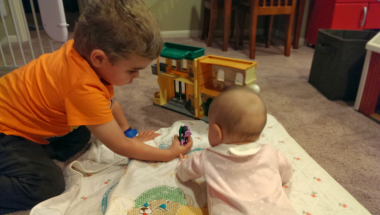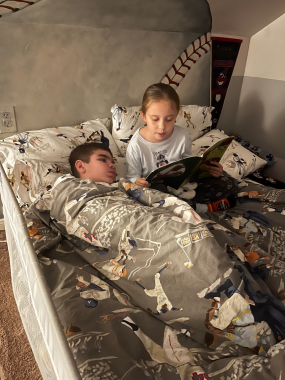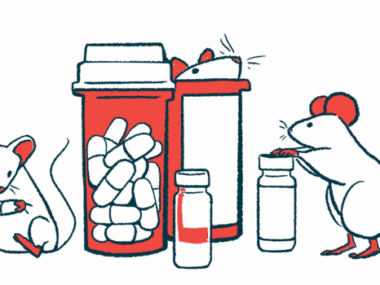What Will Our Daughter Remember?
Written by |

Parenting a child with Sanfilippo syndrome results in many forms of grief.
There is the diagnosis grief, when you mourn the loss of the future you thought your child had. There is regression grief, as you watch your child’s skills slip away day by day, stolen by a monster you can’t prevent from entering your home. There’s anticipatory grief, the breath-stealing sadness that consumes you when you think about a future where your child won’t be physically present with you.
Eventually, all these forms of grief converge into the soul-crushing reality of losing your child.
But even then, the grief doesn’t stop. It’s interwoven into the tapestry of your life, coming up in new and surprising forms. Currently, the one hitting my heart is the question: “What will she remember?”
As I’ve written before, I’m not just parenting a son with Sanfilippo; I’m also parenting a neurotypical daughter. We lovingly refer to her as Little Sister in our public online life, but the reality is that Little Sister hasn’t been the “little” one in anything other than size for about five years.
Only 18 months old when Will was diagnosed, Little Sister hasn’t known a life without Sanfilippo. She overtook her big brother developmentally when she was 3 and he was 6. It’s a constant struggle trying to find a balance of living a fully inclusive family life while also providing Little Sister the activities and outlets she needs to live her own full life.
She’s beautiful with her brother, and, at age 8, has much more understanding and empathy regarding people with differing abilities than most adults. We recognize that she’ll need ongoing support as she continues to grow in her awareness of Will’s condition, and I often worry if she’ll ever resent the direction our lives have had to take or if she’ll come to think of Will as a burden. I wonder if she’ll even remember the times when she actually got to be the “little” sister.
Will was over the moon to become a big brother at age 3. Still hitting developmental milestones and seemingly healthy at that point, he was able to express his joy at finding out that there was a baby in Momma’s tummy — a sister, no less! — and demanded a baby doll so that he could learn to take care of her. He took a big sibling class, helped paint the nursery, and eagerly awaited the day Little Sister would join our family.
When she did, he was the sweetest and most caring brother. Enamored immediately, he would run to check on her if she made a noise, bring me diapers to help change her, and quietly sit trying to nurse his own stuffed animals while I fed his sister.
As she grew, he would read her his favorite books, teach her about shapes and Legos, and do whatever he could to integrate her into his play. Pictures of these beautiful moments pop up occasionally in my social media memories, stinging with the bittersweet reminders of the innocence of our lives before diagnosis.

Will teaches Little Sister about “Sesame Street” in 2014. (Courtesy of Valerie Tharp Byers)
But slowly, things changed. Will’s development slowed down, stopped, and then reversed as Little Sister’s development continued in the statistically normal childhood trajectory. He stopped reading to her and showing her things, and now she was the one bringing me wipes and diapers to help change him. For a while, they met in the middle, working on preschool concepts together at ages 2 and 5, but then Little Sister’s skill workbooks and toys changed and Will’s stayed the same.
Little Sister knows her brother’s needs and doesn’t complain about being his helper. She champions and includes him, and we work to make sure she connects with other siblings in similar situations (while also attempting, as parents, to learn from these siblings’ stories).
But every time one of those precious photo memories pops up on my phone or computer, I make sure to stop and take a moment to share them with her. If she was too young to remember these moments, then I will teach her about them. I will show her that, when he was capable of it, “Big” Brother was just that: an older sibling who could show his love to her by taking care of her, teaching her, and interacting with her.
I cannot help but grieve the type of sibling relationship that Little Sister has lost, but I do rejoice in the way that both she and Will continue to find ways to show love to each other. Their sibling connection may have changed, but it will never be lost.

Little Sister reads bedtime stories to her big brother, Will, in 2021. (Courtesy of Valerie Tharp Byers)
Note: Sanfilippo News is strictly a news and information website about the syndrome. It does not provide medical advice, diagnosis, or treatment. This content is not intended to be a substitute for professional medical advice, diagnosis, or treatment. Always seek the advice of your physician or other qualified health provider with any questions you may have regarding a medical condition. Never disregard professional medical advice or delay in seeking it because of something you have read on this website. The opinions expressed in this column are not those of Sanfilippo News or its parent company, Bionews, and are intended to spark discussion about issues pertaining to Sanfilippo syndrome.






Leave a comment
Fill in the required fields to post. Your email address will not be published.